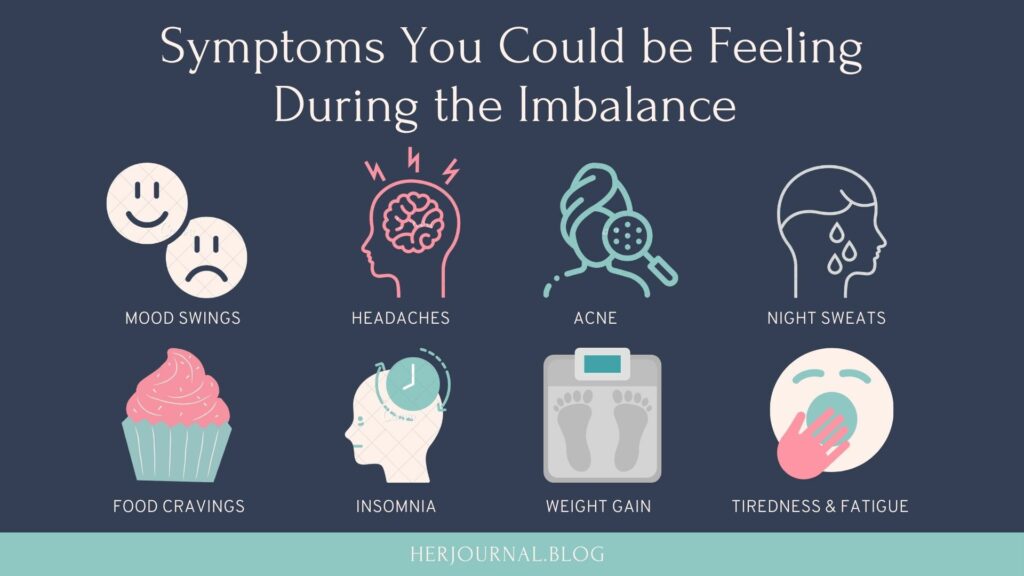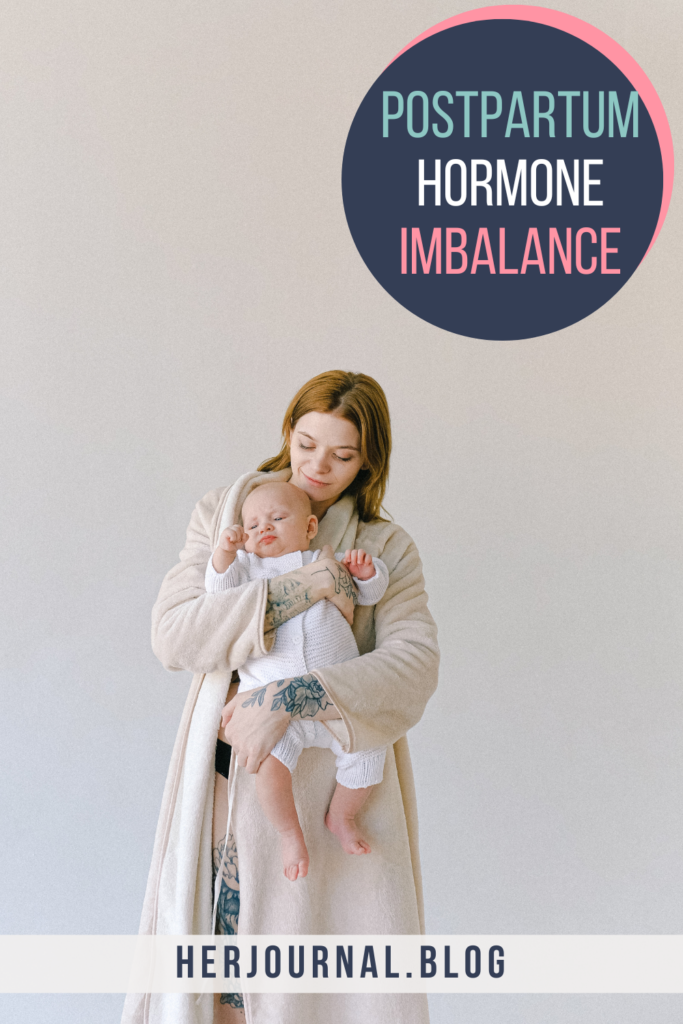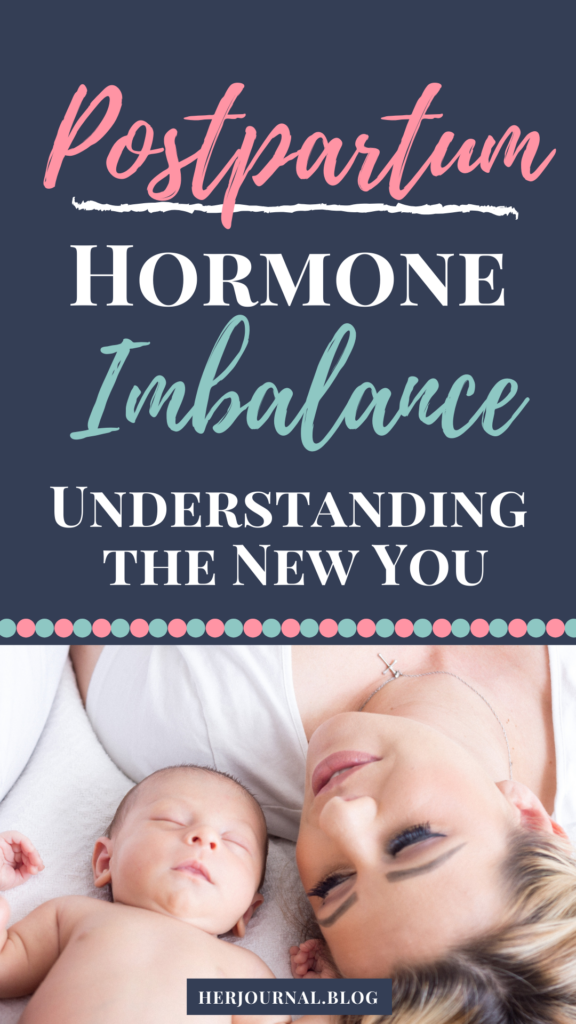We may earn money or products from the companies mentioned in this post.
Last Updated on September 13, 2024 by Samantha Flores
They don’t talk enough about the postpartum hormone imbalance. Instead, expecting mothers are drowning in information about the hormone increase during pregnancy. Do you know what happens to all of those hormones after you deliver your baby?
No matter how many babies you have given birth to, it’s still important to remember that the healing that will take place after pregnancy includes much more than you might realize. It’s more than just waiting for your bleeding to stop. Postpartum healing is an intricate time that must involve patience and grace.
If you are experiencing postpartum hormone imbalance, you might be wondering what the symptoms are and how long this will last. If you are expecting, you might be wondering what to expect after you give birth. This guide will help you understand the imbalance and what to do during this time.
Related: The 5-5-5 Postpartum Rule: What Is It and How to Use It

Understanding the Postpartum Hormone Imbalance: Hormones in Pregnancy
Before you can understand the postpartum hormone imbalance, it’s important to understand the increase of hormones in pregnancy. Did you know pregnant women have more hormones in their bodies during one pregnancy than they will have in their entire lifetime?
You likely already know that your hormones increase rapidly during early pregnancy due to the placenta (hCG). Let’s understand the increase of the other hormones in your body as well during pregnancy.
Estrogen
Estrogen is the primary female hormone. It increases the brain’s serotonin, which is the hormone most associated with happiness. Estrogen is your “happiness hormone.”
In pregnancy, the increase of estrogen helps the uterus and placenta to improve the formation of blood vessels, transfer nutrients, and support a growing baby. This hormone increase is essential for the life you are creating.
Progesterone
Progesterone acts as a natural antidepressant to lower anxiety. It is known as the “relaxing” hormone. During pregnancy, progesterone increases about ten times higher than normal.
The increase of progesterone in pregnancy helps the loosening of ligaments and joints throughout the body to support the growth of your baby. Progesterone is also important in helping prevent preterm labor.
Related: Postpartum Body Changes: How to Accept the New You
Postpartum Hormone Imbalance
Now that you know about the hormones during pregnancy, it’s important to discuss what happens after pregnancy. Do the hormones leave your body?

What happens?
One of the most important things to learn about postpartum that often isn’t discussed is the hormone drop women experience after birth. “The postpartum hormone drop is considered the single largest sudden hormone change in the shortest amount of time for any human being, at any point of their life cycle,” said Dr. Aviva Romm, a Yale-trained, board-certified family physician with a specialty in integrative women’s health and obstetrics. She is also trained in midwifery.
Within three days after giving birth, all of those hormones that were used to sustain a growing baby will completely leave your body. You may experience this hormone decrease immediately after birthing the placenta, which shows up as uncontrollable shaking. I’ve experienced the shaking after all three of my birth experiences while engaging in that golden hour with my newborn.
Consider that your “happiness hormone” and your “anti-stress hormone” have left your body in those early postpartum days. It’s no wonder that women begin to experience mood swings, anxiety, and other side effects after birth. What’s worse is that many women don’t realize what they are feeling is a natural part of healing and they hide silently thinking they are going crazy.
When do the hormones return?
The timeline of the postpartum hormone imbalance will be different for each woman. You can expect the return of your hormones to occur around the time when your menstrual cycle starts again.
It is roughly estimated around six months postpartum is when you can expect your menstrual cycle to return. However, if you are breastfeeding, this will be drastically different as many breastfeeding women do not receive their period while nursing.
Related: The Postpartum Period: How to Survive After Birth
Symptoms of Postpartum Hormone Imbalance
The symptoms you experience might differ from someone else. The following list of symptoms are some of the most common symptoms of a postpartum hormone imbalance:
- Mood Swings
- Cravings
- Headaches
- Insomnia
- Acne
- Night Sweats
- Weight Gain
- Tiredness and Fatigue

It can be difficult to distinguish the difference between a symptom of an imbalance versus something normal once becoming a new mom. For example, tiredness and fatigue could also be attributed to sleepless nights with a newborn.
Notice what you are feeling, and jot down the severity of your symptoms and the frequency. This will be helpful for you to notice if your symptoms are getting worse and when a visit to your doctor is in order. When in doubt, request an appointment for an evaluation.
How to Survive the Postpartum Hormone Imbalance
Knowing what you are experiencing is the first step to surviving the postpartum hormone imbalance. Take action now to help during your healing by using the suggestions below.
Related: Postpartum Hair Loss: What to Expect and How to Help
Talk to Your Spouse/Partner
The most important thing to do is talk to your spouse or partner about what you are experiencing. Your spouse/partner is someone who is around you the most and they know you best. Help them understand how they can support you during this time.
In addition, talking with your spouse/partner will help you make a plan if you feel like the imbalance is impacting your life. Your spouse/partner is someone who wants the best for you. Let them be your support.
Use a Journal
Documenting how you feel will help establish if you are experiencing a postpartum hormone imbalance. Journaling is also helpful to just get your overwhelming thoughts out of your head, which could help with any mood swings you might be experiencing.
When you use a journal consistently, you can track when the symptoms began and if they are becoming worse. The journal can be a helpful tool to take to your doctor to give an accurate detail of what you have been noticing about yourself.
Ask for Help
There is no harm in asking for help, especially as a new mom. “Postpartum is a quest back to yourself, alone in your body again. You will never be the same, you are stronger than you were,” a quote by Amethyst Joy.
This is the time to embrace as much help as possible. Let your spouse/partner help care for you. You can also ask family and friends to support you with whatever you need. Becoming a mother, whether for the first time or the 20th time, requires help from a supportive village. You are not meant to do motherhood alone.

Give Yourself Grace
Part of being a mom is learning to give yourself grace…often! There is no perfect way to be a mom. Oftentimes, you will feel or experience things that are out of your control. Therefore, adapting to new changes can be difficult.
It’s important to understand your limits, though they may change at various stages in motherhood. You will heal and feel better. Everything just takes time and grace. Be gentle with yourself.
See Your Doctor
It’s never a bad thing to contact your doctor if what you are experiencing concerns you. The postpartum hormone imbalance will take time to clear up.
However, that doesn’t mean that you can’t reach out to your doctor if you have concerns or questions. Your health is just as important as your baby’s. Taking care of yourself is taking care of your baby.
Related: Losing Yourself in Motherhood? 3 Tips to Get Back on Track
The Postpartum Hormone Imbalance Won’t Last Forever
The good news is that the postpartum hormone imbalance you might be feeling won’t last forever. There are things you can do while you are experiencing symptoms. Remember to stay hydrated, do your best to get rest, and reach out to people in your support system for help.
I know when you are in the thick of it, it does feel like it will never end. After having three babies, I can tell you for sure that it will end. You will get to a place of feeling comfortable again in your body. It takes time and patience to get there, but it will happen.
Pregnancy is not easy and neither is postpartum. Both chapters are beautiful in their own ways. Focus your energy on recovery and bonding with your baby. The rest can wait.
Pin It!





